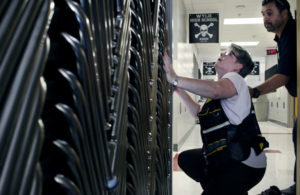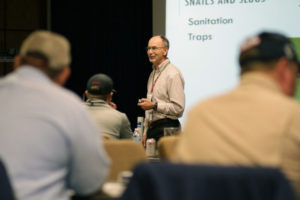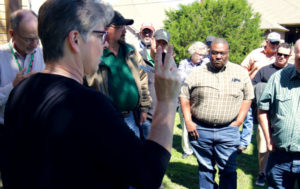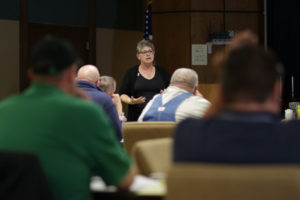
AgriLife Extension school IPM specialist Janet Hurley and Wylie Independent School District IPM coordinator Tony Jacinto inspect a storage space of stacked chairs for pest issues at Wylie High School.
Anyone returning to a Texas public school this semester is safer from pests and pesticides, thanks to a host of integrated pest control practices required by the state and taught to licensed professionals by the Texas A&M AgriLife Extension Service.
Requirements for integrated pest management, or IPM, in Texas schools were passed by the Texas Legislature in 1991. IPM is the practice of controlling pests with alternatives to pesticide. It employs other methods that consider environmental safety and human health.
New laws, shift in focus

AgriLife Extension state pesticide safety coordinator Don Renchie, Ph.D., leads school IPM training in an industrial school kitchen.
By the time school IPM became law, AgriLife Extension’s state pesticide safety coordinator Don Renchie, Ph.D., and urban entomologist Mike Merchant, Ph.D., had
already been training pest control professionals in safe application for schools across the state. They were steeped in collaboration with the Texas Structural Pest Control Board — of which Merchant was a member — to develop comprehensive curricula for the training.
“There had been major incidents of human contact with pesticides in Texas schools, due to application by unlicensed applicators, leading up to passage of the IPM laws in 1991,” Renchie said. “In Texas, we decided that our children were most important, and that’s why IPM is the law here.”
Only 23 states have school IPM laws or regulations, according to the National Pest Management Association.
As provisions of the Texas’ school IPM law took effect in 1995, Renchie and Merchant shifted focus to developing a training series for the IPM coordinator. This staff position is still required at every Texas school district today. They are responsible for ensuring safe school district spaces by adhering to all IPM mandates, existing and emerging.
IPM coordinators continue to be trained by AgriLife Extension, but the agency’s training reach, evaluation systems and advanced IPM techniques help make schools safer for Texas students, faculty and staff than ever before.
A boost for school IPM training in Texas

AgriLife Extension retired entomologist Mike Merchant, Ph.D., leads school IPM training.
In 2001, a grant from the U.S. Environmental Protection Agency allowed Renchie and Merchant to hire AgriLife Extension school IPM specialist Janet Hurley, Dallas. The grant also created the Southwest Technical Resource Center for School IPM. Hurley joined AgriLife Extension as director of the center, whose education materials live on as part of AgriLife Extension’s comprehensive teachings. Her work to organize school IPM training across Texas dovetailed with a previous grant that Merchant and Renchie were awarded to create “The ABCs of IPM” video series. The series is still taught to IPM coordinators as part of state requirements.
By that time, she said, roughly 80% of Texas schools had fallen out of compliance with state IPM standards. Additionally, a more streamlined system for professional training was needed across the state.
Seeking solutions
“When I got there, it was six hours of training, pat ‘em on the back and ‘see ya later, bye,’” Hurley said. “I said ‘No wonder the schools look like deer in headlights with IPM standards.’ And my bosses said ‘well that’s why we hired you. Now what are you gonna do about it?’”
She began to develop — with Merchant, Renchie and EPA grant colleagues in New Mexico and Oklahoma — one-day and two-day school IPM trainings, which emphasized hands-on work. It is the same model AgriLife Extension uses to deliver emerging school IPM information today at the IPM Experience House.

AgriLife Extension IPM Experience House, Dallas
While Hurley worked to broaden AgriLife Extension’s reach, Renchie and Merchant could still lead school IPM trainings and focus on expanding responsibilities of entomology and pesticide safety — the overarching areas of urban pest management statewide.
Hurley created a map of Texas’ roughly 1,030 school districts and began reaching out to them with what she calls “the gospel of IPM.” By 2008, she built enough enthusiasm among Texas schools to form the nation’s first statewide association of school IPM professionals — the Texas IPM Affiliates for Public Schools. Before the group disbanded, it welcomed more than 1,000 attendees to its annual meeting between 2009 and 2014.
These early efforts all contributed to making AgriLife Extension a driving force in the unique success of IPM in Texas schools and beyond.
School IPM impact

Janet Hurley leads a school IPM training for school district IPM coordinators in North Texas.
Since 2002, AgriLife Extension has offered 234 full days of school IPM training classes and reached 5,861 participants from 1,638 school districts. Hurley’s efforts alone include 265 personal site visits to Texas school districts. She assists with compliance issues and helps IPM programs prepare for inspections and awards.
As a result of these efforts, more than 20 Texas school districts are winners of the IPM Institute of North America’s national IPM Star award — more than any other state.
Among the state’s recognized districts is Wylie Independent School District, whose IPM coordinator is Tony Jacinto. The district failed to meet state IPM standards in 2016, before Jacinto heard about Hurley and AgriLife Extension from colleagues in another district.
“At that time, I had no experience with IPM and asked Janet to come teach me the ABC’s,” Jacinto said.
By 2019, Wylie ISD had become one of Texas’ national IPM Star districts, and Jacinto had scored 103 out of 100 during the award audit — above a perfect score.
Hurley is also a strong supporter of the IPM Star award, which exceeds even Texas’ standards for IPM.
What’s next
Today, Renchie continues to train pest control professionals for licensing, and Merchant retired in August following more than 30 years with AgriLife Extension.
“It’s widely recognized that IPM adoption benefits health and the environment,” Merchant said. “These accolades and increased compliance numbers show that Texas schools are safer as a result of AgriLife Extension’s reach and work.”
Meanwhile, in conducting 75 regional two-day trainings and 84 one-day trainings since 2002, Hurley remains the most active coordinator of school IPM training in Texas, and likely in the U.S., Merchant said.
 “She has an almost encyclopedic knowledge of Texas school districts and their IPM personnel,” he said.
“She has an almost encyclopedic knowledge of Texas school districts and their IPM personnel,” he said.
Through AgriLife Extension, Hurley also maintains a school IPM hotline and the Texas School IPM website, providing learning resources and training information. Her industry newsletter, School Pest News, is in its 137th edition since 2002, and it circulates to a readership of about 1,600 per issue. She is active in the International IPM Symposium steering and awards committees and is on the National School IPM Steering Committee.
Over the next year, AgriLife Extension will expand IPM offerings with its public Residential IPM course series, which covers general integrated pest management for homes.
Hurley will propose a comprehensive research initiative to determine rat presence in Texas as well as the types of communicable diseases they carry, which remains largely speculative, she said.
“We’re just going to keep on building,” she said.
Written by: Gabe Saldana, Communications Manager, Texas A&M AgriLife Research and Extension Center of Dallas

 .
.